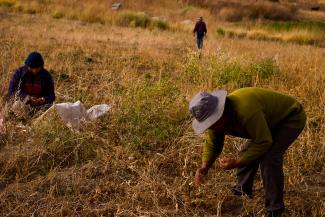Milei Repeals Argentina’s Indigenous Territorial Emergency Law
20 Desember 2024agnes

By Candela Palacios (CS Staff)
On December 10, 2024, on International Human Rights Day and the first anniversary of his inauguration as president, the far-right liberal Javier Milei struck a harsh blow against the rights of Indigenous communities in Argentina. By means of a decree, Milei annulled the 2006 Law 26160 on Indigenous Territorial Emergency.
The law established that the execution of sentences, procedural and administrative acts aimed at evicting Indigenous communities from the lands they occupied should be suspended. The law also ordered a survey of Indigenous communities in the country and their territories. To this end, the National Program for the Territorial Survey of Indigenous Communities (Re.Te.C.I.) was created, with representatives of the Council for Indigenous Participation, made up of two representatives of each Indigenous Peoples from each province. The result of the survey was to be a Technical Folder delivered to each community, containing:
- A Socio-Community Questionnaire (CUESCI), with the data provided by the Community about the current situation in which they live;
- In the Indigenous Communities that are accredited to occupy lands in a current, traditional, and public way, the following would be delivered: occupation cartographies, cadastral characterization cartographies, and, according to the case, different maps reflecting the occupation characteristics and the overlap with the registry holders.
- A Historical Anthropological Report with the history of each Peoples and community, and a description of their relationship with the land;
- A Legal Report with the legal background of the community, the cadastral and ownership information of the surveyed land, and suggestions of possible administrative or judicial strategies to address their claim; and
- An Administrative Resolution that considers the survey completed and, if applicable, recognizes the current, traditional, and public occupation of the community.
The Technical Folder was intended as a tool that, with a future Community Property Law, would make it possible to regularize land possession.
Law 26160 was passed in 2006 as an emergency law. This implied that the law was considered necessary given the serious situation of dispossession that Indigenous communities pre-existing in the current Argentinean state suffered and still suffer. Emergency laws in Argentina provide for measures that seek to mitigate the spread of damage to the affected communities and solve the problem at the root of the crisis situation.
However, this survey was never completed due to a lack of political will and funding. As emergency laws in Argentina are valid for four years, this law had to be extended four times. The first three extensions were granted by law, and the fourth and last by presidential decree in 2021. This last extension was repealed by the decree of 10 December 2024, rendering the law null and void. The long-awaited Law on Community Land Ownership has not progressed during these years either.
Unfortunately, this blow against the rights of the country’s Indigenous Peoples did not come as a surprise. A bill with the same objective was presented to the national Congress in 2022 by Victoria Villarruel, the current vice president, and then national representative. This decision is also not unexpected after a year of defunding and dismantling of state bodies and instruments for the defense of Indigenous rights, as well as persecution, repression, and prosecutions of communities throughout the country.
As part of a process of state funding cuts, on October 1, the current president of the National Institute of Indigenous Affairs (INAI) abolished RE.NA.CI, the National Registry of Indigenous Communities, employing resolution 53/2024. The RE.NA.CI was an instrument founded in 1989 through Law 23302, whose objective was to have an updated list of registered and unregistered Indigenous communities in the country. The communities registered in the registry obtained legal status, and since 2000, they have been protected under Convention 169 of the International Labour Organization (ILO) on Indigenous and Tribal Populations. The repeal of RE.NA.CI implied the suspension of all pending registration applications and urged provincial registries to take responsibility for registering communities within their jurisdictions.
Over the past year, persecution, evictions, repression, and legal proceedings against Indigenous communities for alleged occupation of their ancestral lands have been on the rise. It is to be expected that the repeal of the emergency law will facilitate an increase in this type of violations of Indigenous territorial rights, violations that in many cases are linked to the search for economic profit from resources present in the communities’ territories, such as lithium in the north of the country, or oil in the south.
Despite this bleak context, various communities and Indigenous resistance organizations have responded to these events by urging the country’s Indigenous peoples not to give up their struggle to defend their rights. The disappearance of Law 26160 does not imply that the Indigenous Peoples of the current Argentine territory have been left outside the protection of other national and international legal instruments. Various communiqués circulated on the day of the law’s repeal among Indigenous activist networks urge the communities to continue to assert their rights, to file legal complaints, and to publicize the various situations of dispossession and mistreatment to the public.
It was decades of organized Indigenous struggle that resulted in the legal instruments that today, the government and large economic actors seek to destroy for their benefit. The struggle for the defense of Indigenous rights, cultures, and territories continues, as it has for more than five centuries.
Photo by Kris Haamer.
